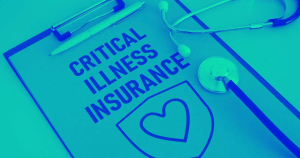Heart disease, cancer, diabetes, and other chronic diseases — defined as conditions that last a year or more — are the leading causes of disability and death in the U.S.¹
A major medical condition can create not only health challenges but also serious financial strain. Beyond the costs of medication, treatment, and hospitalization, everyday expenses — like housing, groceries, and childcare — continue to add up. Financial stress during recovery can quickly deplete savings, making it harder to focus on healing.
Recent research revealed that 1 in 12 adults have medical debt, with 6% (14 million people) owing more than $1,000 and 1% (3 million people) owing over $10,000.² That’s where critical illness insurance can help by offering an extra layer of financial protection.
What Is Critical Illness Insurance?
Critical illness insurance is a type of supplemental health coverage that pays out a lump sum if you’re diagnosed with a covered illness or medical condition.
Unlike standard medical insurance, which usually pays providers directly, this policy pays the benefit directly to you. That means you can use the money however you need — whether that’s covering hospital bills, childcare, groceries, mortgage payments, or other unexpected expenses during recovery.
3 Reasons to Consider Critical Illness Insurance
1. Helps Cover Costs Beyond Medical Insurance
Traditional health insurance may not cover all expenses related to a serious illness. Additional costs — like transportation to treatment centers, childcare, or grocery delivery — often fall on you. Critical illness insurance can help ease that financial burden.
2. Provides a Direct Lump-Sum Payment
With critical illness insurance, you receive a lump-sum payout (for covered conditions), giving you the flexibility to decide how best to use the funds — from paying household bills to managing ongoing medical expenses.
3. Covers a Range of Serious Conditions
Depending on your plan, covered conditions may include heart attack, stroke, cancer, major organ failure, and other life-altering illnesses. Always review your policy for the complete list, as coverage can vary by provider.
When Is Critical Illness Insurance a Good Fit?
Critical illness insurance may be worth considering if:
-
Your employer offers it at a low cost
-
You or a family member have a history of chronic or serious health conditions
-
You want added protection to avoid draining savings during recovery
Do I Still Need It If I Have Savings?
An emergency fund is valuable, but not everyone has one large enough to cover serious medical costs. According to a Bankrate study, only 44% of U.S. adults have enough savings to handle an unexpected expense of $1,000 or more.³
Critical illness insurance can act as a safeguard to help preserve your savings if a major illness strikes.
How to Get Critical Illness Insurance
-
Through your employer: Many companies offer employee critical illness insurance. You can typically sign up during open enrollment, after a qualifying life event, or when you first start your job.
-
Individual plans: If your employer doesn’t provide coverage, you can purchase a policy directly from an insurance provider.







